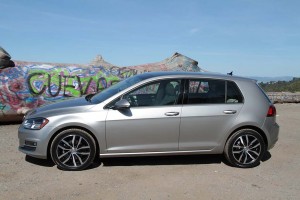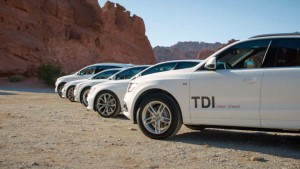Volkswagen has reached a settlement with federal and state regulators involving about 80,000 diesel vehicles not covered by the $15 billion settlement the automaker agreed to last June.
While some details have yet to be released, the tentative deal that has been presented to U.S. District Judge Charles Breyer in San Francisco authorizes both buybacks and fixes for Volkswagen, Porsche and Audi models equipped with the German maker’s 3.0-liter turbodiesel. The earlier agreement covered 475,000 VW and Audi vehicles fitted with a 2.0-liter diesel engine.
“The agreement announced by the Court today between Volkswagen and U.S. environmental regulators is another important step forward in our efforts to make things right for our customers,” said Hinrich J. Woebcken, President and CEO of Volkswagen Group of America, Inc. “
(Has VW put the nail in the coffin for U.S. diesels? Click Here.)
The settlement involving VW, the Environmental Protection Agency and other state and federal regulators is the latest development in a scandal triggered by the EPA in September 2015. The agency revealed that Volkswagen has used a so-called “defeat device,” capable of detecting when a car with the 2.0-liter engine was undergoing tests, to illegally meet emissions rules.
VW almost immediately acknowledged the subterfuge, later conceding it had also rigged the larger engine. That led to the immediate halt of sales of all VW, Porsche and Audi diesel products in the U.S. At their peak, the two engines were used in nearly a quarter of the products the VW brand sold in the States.

Unlike the 2.0-liter diesel used in models like this Golf, VW believes it can fix most of the more upscale 3.0-liter turbodiesels.
A $14.7 billion settlement was announced in June covering the 2.0-liter turbodiesel, more than two-thirds of that meant to fund a buyback plan, the rest to promote sales of zero-emissions vehicles and to take steps to offset the extra pollution VW had caused.
The new agreement, according to a statement from the automaker, “would allow Volkswagen to recall more than 75 percent of affected 3.0L TDI V6 vehicles to bring them into compliance with the emissions standards to which they were certified, if appropriate modifications are approved by EPA and CARB.”
That remains a big “if,” however, VW and the two agencies failing to so far agree on a fix that would not only meet emissions standards but be robust enough to last through normal daily use – something that is also required by law.
(VW launches production of new Atlas SUV at Tennessee plant. Click Here for more.)
Barring an agreement on the necessary modifications, VW could yet wind up having to buy back all 80,000 vehicles with the 3.0-liter engine. Even with an acceptable technical solution, VW will buy back or terminate the leases on 20,000 vehicles from the 2009 to 2012 model-years.
Some details have yet to be released, said Elizabeth Cabraser, who serves as lead council for those suing VW. “As reported today by Judge Breyer, we have reached an agreement-in-principle with Volkswagen on substantial aspects of relief for 3.0-liter TDI Generation 1 and Generation 2 class members, and are working to resolve remaining issues.”
That is believed to include specific monetary details but the amount, per vehicle, is likely to be more than for those products equipped with the more mainstream 2.0-liter engine. Under the June settlement, VW agreed to cover the full trade-in price on Sept. 18, 2015, the day the scandal broke, along with $5,100 to $10,000 per vehicle, depending on its age.
The economic impact of the scandal has been enormous. VW has also had to pay $1.2 billion to settle lawsuits by its U.S. dealers, and it is still negotiating a settlement with stockholders.
Meanwhile, it is facing criminal investigations in both the U.S. and Germany. An engineering manager who worked on the defeat device pleaded guilty earlier this year to charges leveled by the U.S. Department of Justice. Others are eventually expected to face similar allegations. In Germany, former VWAG CEO Martin Winterkorn is one of a number of executives now under investigation.
The longer-term question centers around the damage the scandal has done to Volkswagen’s reputation. The maker seems positioned to topple Toyota as the world’s best-selling automaker this year, but VW has taken a big hit in the U.S., sales tumbling by double-digits since the scandal broke.
“We are committed to earning back the trust of all our stakeholders and thank our customers and dealers in the United States for their patience as the process moves forward,” said Woebcken, VW’s U.S. chief.
(VW depending on turnaround in U.S. market. Click Here for the story.)

